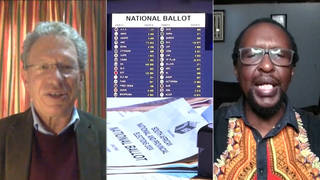
We end our special coverage of the Nelson Mandela memorial with a video message delivered by the renowned poet and author Dr. Maya Angelou in his memory. They first met in 1962 before he was imprisoned. “Yes, Mandela’s day is done,” Angelou said. “Yet we, his inheritors, will open the gates wider for reconciliation. And we will respond generously to the cries of blacks and whites, Asians, Hispanics, the poor who live piteously on the floor of our planet.”
Transcript
AMY GOODMAN: We end today’s show with a video message delivered by the renowned poet and author Dr. Maya Angelou in memory of Nelson Mandela. They first met in 1962 before he was imprisoned.
MAYA ANGELOU: His day is done.
Is done.
The news came on the wings of a wind, reluctant to carry its burden.
Nelson Mandela’s day is done.
The news, expected and still unwelcome, reached us in the United States, and suddenly our world became somber.
Our skies were leadened.
His day is done.
We see you, South African people standing speechless at the slamming of that final door through which no traveler returns.
Our spirits reach out to you Bantu, Zulu, Xhosa, Boer.
We think of you and your son of Africa, your father, your one more wonder of the world.
We send our souls to you as you reflect upon your David armed with a mere stone, facing down the mighty Goliath.
Your man of strength, Gideon, emerging triumphant.
Although born into the brutal embrace of Apartheid, scarred by the savage atmosphere of racism, unjustly imprisoned in the bloody maws of South African dungeons.
Would the man survive? Could the man survive?
His answer strengthened men and women around the world.
In the Alamo, in San Antonio, Texas, on the Golden Gate Bridge in San Francisco, in Chicago’s Loop, in New Orleans Mardi Gras, in New York City’s Times Square, we watched as the hope of Africa sprang through the prison’s doors.
His stupendous heart intact, his gargantuan will hale and hearty.
He had not been crippled by brutes, nor was his passion for the rights of human beings diminished by twenty-seven years of imprisonment.
Even here in America, we felt the cool, refreshing breeze of freedom.
When Nelson Mandela took the seat of Presidency in his country where formerly he was not even allowed to vote we were enlarged by tears of pride, as we saw Nelson Mandela’s former prison guards invited, courteously, by him to watch from the front rows his inauguration.
We saw him accept the world’s award in Norway with the grace and gratitude of the Solon in Ancient Roman Courts, and the confidence of African Chiefs from ancient royal stools.
No sun outlasts its sunset, but it will rise again and bring the dawn.
Yes, Mandela’s day is done, yet we, his inheritors, will open the gates wider for reconciliation, and we will respond generously to the cries of Blacks and Whites, Asians, Hispanics, the poor who live piteously on the floor of our planet.
He has offered us understanding.
We will not withhold forgiveness even from those who do not ask.
Nelson Mandela’s day is done, we confess it in tearful voices, yet we lift our own to say thank you.
Thank you our Gideon, thank you our David, our great courageous man.
We will not forget you, we will not dishonor you, we will remember and be glad that you lived among us, that you taught us, and that you loved us all.
AMY GOODMAN: Maya Angelou, reciting her poem, “His Day is Done,” a tribute to the late Nelson Mandela. They first met in 1962 when Mandela was on a secret trip through Africa. You can go to our website to see highlights and excerpts from past Democracy Now! interviews about Nelson Mandela, including my interview with filmmaker Yoruba Richen about her film, Promised Land, which takes a critical look at land reform and racial reconciliation in the new South Africa.













Media Options